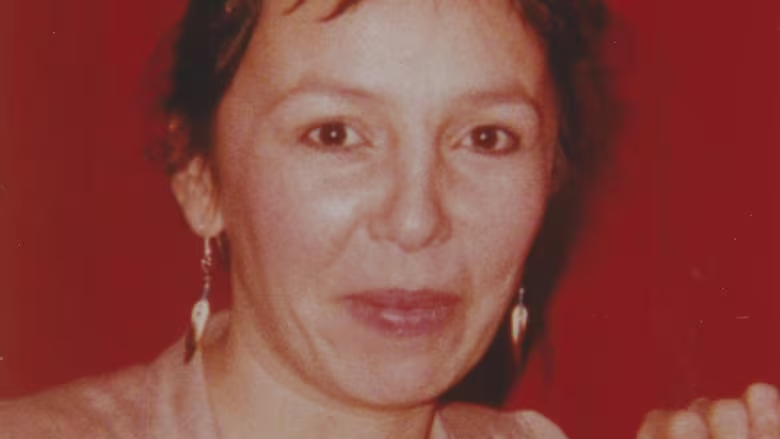Who killed Sonya Cywink? 30 years on, her sister is still hopeful justice will come
Sonya Cywink was last seen on Aug. 26, 1994 near Dundas and Lyle streets in London

It was 30 years ago Monday when Sonya Nadine Cywink was last seen.
The time was 2 a.m., near Dundas and Lyle streets in London, Ont.
Four days later, the 31-year-old mother-to-be was found dead in Southwold Township.
Three decades on, few other details have been made public by Ontario Provincial Police in the case, and closure remains elusive for Sonya's family.
Sonya's sister, Meggie Cywink, still hasn't given up hope those responsible will be found, because someone out there knows something, and people are bound to talk sometime.
"Thirty years in… I think there is some sense of compassion and empathy toward my sister's life, the loss of her life and her unborn baby," Cywink told CBC News.
"People, especially women, are starting to talk. I've developed trusting relationships with women over the past six years, and I think there's some truth starting to happen. I'm feeling very hopeful."

On Friday morning, Sonya's loved ones will gather where her body was found to honour her life, the lives of other missing and murdered Indigenous women and girls, and trans and two-spirited people.
Community teach-ins focusing on violence prevention are also being held at N'Amerind Friendship Centre this week, said Maggie, who is hosting one of them.
It's this kind of outreach she says has helped her heal, and turn tragedy into something positive.
"Instead of dwelling on the fact we don't have answers, this is a way to help other women stay safe."

Originally from Whitefish First Nation near Sudbury, Sonya was the second-youngest of 13 siblings, and was 24-weeks pregnant when she died.
When her body was discovered on Aug. 30, 1994 at the Southwold Earthworks, a historic former First Nation settlement southwest of London, police said her body showed signs of blunt force trauma.
In 2019, Cywink told CBC News her sister had been living with a roommate in east London, but wasn't close to other siblings living in the area.
That year, two billboards with Sonya's face were erected in the city. Today, the call-out is featured on eight city buses.
Police have not said how, when, or where Sonya was killed, and Cywink says she's never seen forensic pathology reports as the case is still open.
"Did she meet her demise early that morning? Or was she alive for a course of time?" she said.
"After 30 years, you'd think they would, like, tell me something more… When they do the press release, it's the same old '$60,000 for anything leading to the arrest and conviction of persons responsible.'"
On Monday, police issued another plea for information. The $60,000 reward, put up by the province with $10,000 from Sonya's family, remains unclaimed.
"It is somewhat repetitious, in a sense, for the media releases, but at the same time, these continued requests actually generate tips that the OPP uses and follows up on," said Elgin OPP Cst. Brett Phair.
Police sympathize with the frustration family have over the lack of information, he said, but some information can't be disclosed to loved ones to protect case integrity and secure a potential conviction.
"That's the primary goal, and we understand that it can be frustrating in that process, so it makes it difficult for us to navigate both fields," he said.
WATCH | Failure to implement MMIWG calls to justice 'not acceptable to our people,' AFN chief says
As she has pushed for answers in her sister's death, Cywink has also advocated for other missing and murdered Indigenous women and girls (MMIWG).
In 2017, she was brought on as a special advisor for the Ministry of the Attorney General during the national MMIWG Inquiry.
A recent progress report issued over the summer by the Assembly of First Nations found only two calls for justice from the inquiry's final report had been fully implemented since it was released in 2019.
The epidemic is not slowing, Cywink says. A MMIWG database she has worked to compile contains at least 1,972 people dating back to the 1800s.
Cywink has previously said she thinks whoever killed her sister knew her. She believes the key to finding the killer, and those in other unsolved MMIWG cases, may be involving families.
"That's who these people want to talk to. They don't want to talk to police. They don't trust police," she said, referring to people with information. In Sonya's death, the same names keep resurfacing, she noted.
"They're more willing... to reach out and have a conversation and, perhaps, lay their conscience on the table, and talk to a family member about it… It just really takes one person."

With files from Liny Lamberink, Olivia Stefanovich, and Jackie McKay


